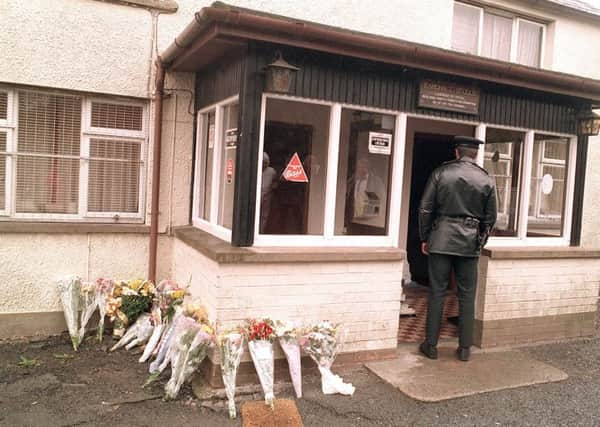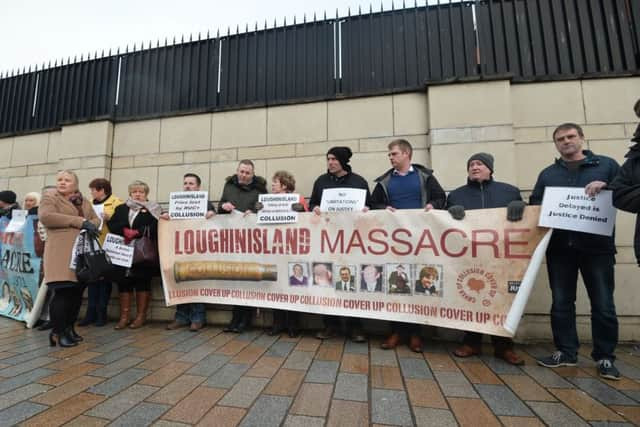Judge in Loughinisland case should step aside says lawyers for Ombudsman


In a dramatic move, lawyers representing Northern Ireland’s Police Ombudsman and relatives of those killed in the massacre argued that Mr Justice McCloskey should withdraw due to a potential perception of subconscious bias.
Their application was based on his role as a barrister in a separate legal challenge 16 years ago.
Advertisement
Hide AdAdvertisement
Hide AdIt came as he was due to announce whether to quash the watchdog’s findings that RUC officers colluded with loyalists who massacred six Catholic men 23 years ago.


Instead, a decision on the application to recuse himself will now be given in seven days time.
Last month Mr Justice McCloskey delivered a landmark verdict that the Ombudsman’s report was procedurally unfair.
In a legal challenge mounted by two retired senior policemen, he held that it had gone beyond the body’s statutory powers in reaching conclusions on events surrounding the killings which were unsustainable in law.
Advertisement
Hide AdAdvertisement
Hide AdUVF gunmen opened fire in the Co Down village pub as their victims watched a World Cup football match in June 1994.


The men killed were: Adrian Rogan, 34, Malcolm Jenkinson, 53, Barney Green, 87, Daniel McCreanor 59, Patrick O’Hare, 35, and Eamon Byrne, 39. Five others were wounded in the attack.
In June last year the Police Ombudsman, Dr Michael Maguire, said collusion between some officers and the loyalists was a significant feature in the murders.
He found no evidence police had prior knowledge, but identified “catastrophic failings” in the investigation.
Advertisement
Hide AdAdvertisement
Hide AdOne of those who issued judicial review proceedings against Dr Maguire’s assessment was Raymond White, a a representative of the Northern Ireland Retired Police Officers’ Association.
It was stressed that the report had not blamed him for any of the alleged investigative failings.
However, the court heard today that he was involved in a separate legal bid back in 2002 to overturn former Police Ombudsman Nuala O’Loan’s devastating report into the Omagh bomb investigations.
Mr Justice McCloskey had acted as senior counsel for police officers behind that challenge - who included Mr White.
Advertisement
Hide AdAdvertisement
Hide AdNewly instructed counsel for the Ombudsman, Barra McGrory QC, and the Loughinisland families’ legal representatives argued that he should now withdraw from the case.
They are seeking a fresh hearing before another judge.
During exchanges Mr Justice McCloskey confirmed he had no memory of being involved in the earlier litigation until it was drawn to his attention, describing his recollection as “zero”.
It was stressed by counsel that they were not calling into question his judicial independence.
But Mr McGrory, Northern Ireland’s former Director of Public Prosections, insisted the application was based on possible public perception.
Advertisement
Hide AdAdvertisement
Hide AdReassurances which could have been given at the outset of proceedings cannot be given now that a ruling has been made in favour of the policemen, he contended.
“In the circumstances of this case; given it’s history, given the years of dispute, and given the personalities which involved one of the applicants in the Omagh litigation, the lay observer is likely to be highly critical of an assertion by the court that the court had no memory of it and therefore it cannot have influenced the court’s views,” Mr McGrory said.
With the potential for an appeal against findings reached on the Loughinisland report, the Ombudsman’s lawyers had to seek recusal if they plan to raise that point at any future hearing.
Victims’ relatives packed into the public gallery listened as Mr Justice McCloskey described his involvement in thousands of cases over the course of a 38-year career in private practice and on the bench.
Advertisement
Hide AdAdvertisement
Hide Ad“A human being, by definition, can only remember some of them,” he said.
Accepting the point, Mr McGrory responded that it was the apprehension of possible subconscious bias.
“We are dealing with a deeply sensitive and controversial multiple murder, hotly contested around the issue of collusion since it occurred and the subject of two Ombudsman reports,” he continued.
“Your Lordship has been permitted to disclose a view on the case before Your Lordship’s connection to some of the personalities was brought to his attention.”
Advertisement
Hide AdAdvertisement
Hide AdFiona Doherty QC, representing the Loughinsland families, contended that the case was part of a “long-running battle” serving and former police officers have waged against the Ombudsman’s powers.
“Where there’s a doubt it should be resolved in favour of recusal,” she said.
But David McMillen QC, for the retired policemen, countered that the application had no merit.
He claimed the Ombudsman had been “embarrassed” into the legal step by a combination of the judgment and a press report on the issue.
Advertisement
Hide AdAdvertisement
Hide Ad“Not for one minute could the observer with knowledge of the facts think there’s a real possibility of bias, he insisted.
Counsel under a legal duty to provide the utmost representation for all clients should never be confused with sharing their “cause”, the court heard.
The barrister also pointed out that Mr White never had any role in the investigations into the Loughinisland massacre or the 1998 Omagh bombing when the Real IRA killed 29 people.
Adjourning for a week, Mr Justice McCloskey expressed regret at the further delay in his final determinations.
Advertisement
Hide AdAdvertisement
Hide Ad“The issue is whether the trial judge at this stage in proceedings should withdraw from them and rewind the clock to the beginning, to the extent that another judge should hear the case afresh,” he explained.
Before rising, however, he cited a previous judgment where he “lambasted” the police for improper conduct on issues of disclosure. ends